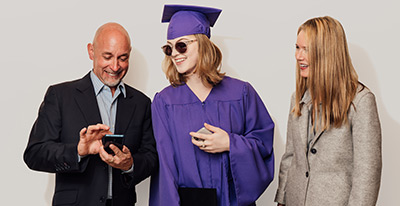
Personal Finance Tips
Why Getting College Ready Means Enrolling with Zelle®
Your student is getting ready to head off to college. So much to do to prepare. One item you should definitely add to your to-do list is to get both of you enrolled with Zelle®, if you're not already. Zelle® is an excellent way for your student to split costs with friends or roommates, and keep track of it all in their mobile banking app. More importantly, you have a fast, easy way to send your student money for those emergencies that can pop up along the way.
Start the Conversation
Enrolling your student with Zelle® is a great opportunity to initiate a conversation about how to make smart financial decisions before your student goes off on their own. A little money management 101 about the importance of following a budget, tracking expenses, and managing spending can effectively lay the groundwork to help your student develop good money habits. If your student is living with roommates, Zelle® is an easy way for them to split costs like rent, utilities, or groceries. Instead of texting roommates the amount they owe, Zelle® makes it easy to send a payment request1 right from the BCB Mobile app. Roommates can easily respond to the payment request from their own banking app, even if they don't have an account with Benchmark Community Bank.
Here's how your student can send payment requests to friends and roommates:
Step 1: Log into the BCB Mobile app.
Step 2: From the menu bar, select "More" and then "Send Money with Zelle®."
Step 3: Select "Request."
Step 4: If you're already enrolled with Zelle®, select your recipient (by searching for your contact or adding a new contact using their email address or U.S. mobile number), then type in the requested amount, add a little note such as "Rent" or "Groceries" and click "Request."2
Using Zelle® to split household expenses will make it easy for your student to keep track of what's owed, to whom, by whom, and for what purpose, helping them to manage their money more effectively.
When They Need Your ($$$$) Help
Most college students get some type of financial help from their parents while in college. In addition to paying the typical college expenses like tuition, books, housing, and food, students may also need help for unexpected emergencies, like car repairs, computer software, or other necessary supplies. Zelle® comes to the rescue when those situations arise. It's a fast, easy, and safe way to send money to your student when they're in a pinch. With Zelle®, money is sent directly to their bank account and available to spend in minutes2 so they can take care of whatever life throws at them.
Dealing with "That" Friend
There's always that one friend who forgets their wallet or never has cash on them. Give your student guidance on how to avoid getting stuck picking up the cost for that friend's coffee fix or share of the pizza, without the embarrassing awkwardness. All they have to do is ask for them to send money with Zelle®. If they don't have Zelle® they can easily enroll with their email address or U.S. mobile number and bam, they're out of excuses.
Zelle® Adds a Little Peace of Mind
Typically, college life means sharing everything from household bills to a fun night out after a big exam. Zelle® helps your student calculate everyone's share, send money, and even request money1 to avoid those awkward moments. Perhaps most importantly, you can quickly and easily send your student money when an unexpected emergency arises.
Learn more about how Zelle® works.
1Payment requests to persons not already enrolled with Zelle® must be sent to an email address. 2U.S. checking or savings account required to use Zelle®. Transactions between enrolled users typically occur in minutes. Zelle® and the Zelle® related marks are wholly owned by Early Warning Services, LLC and are used herein under license.
Wherever the Summer Takes You...Zelle® Can Help Make It Great!
It's summer! So many things to do, places to go, and friends to visit. Whatever plans you make this summer, Zelle® can make splitting shared vacation expenses a breeze.
Road Trip with Friends? Always a Fun Option
There's nothing better than hitting the road with your best friends and playing your favorite tunes while making fun stops along the way. A road trip is one of the best ways to make memories—and done right—the journey can be just as much fun as the destination.
With Zelle® along for the ride, you can pay your share for gas, split the costs of meals, and divide the costs of accommodations with your friends without carrying cash, paying separately, or trying to remember who picked up the check last. All you need to send or receive money is an email address or U.S. mobile number. Sharing costs and splitting expenses while on vacation can get tricky. Whose turn is it to pay? How much do you owe? Are you still owed money? Avoid the awkwardness and simplify the experience by paying exactly what you owe in the moment with Zelle®. You can even include a note in the memo field so you'll have a record of your payments right in your banking app.
Planning Reunions and Annual Gatherings Just Got Easier
Planning a family reunion or annual trip with friends this summer? If you're the designated planner, it may be up to you to book the plane tickets and the accommodations so everyone can be together. Not to mention scheduling lots of fun activities from snorkeling to an afternoon at the ballpark. But paying upfront adds up fast and you don't want to get stuck paying more than your share if someone cancels. Before making large payments for the group, send your family or friends a payment request with Zelle®. They can easily respond to your payment request from their mobile banking app, even if they don't have an account with Benchmark Community Bank. The best thing is, the money is sent directly to your bank account and is available to spend in minutes.1
How to Request Money with Zelle®
Step 1: Log into the BCB Mobile app.
Step 2: From the menu bar, select "More" and then "Send Money with Zelle®."
Step 3: Select "Request."
Step 4: If you're already enrolled with Zelle®, select your recipient (by searching for your contact or adding a new contact using their email address or U.S. mobile number), then type in the requested amount, add a little note such as "Baseball tickets" or "Taco lunch" and click "Request."2
Thank Those Who Make Your Getaway Possible
It's time to head home and you haven't heard a word from your house sitter, dog walker, or cat companion the entire trip. No news is good news. Having those you trust take care of your pets, water the plants, bring in the mail, and generally keep an eye on the house helps you to have a more relaxing vacation. Thank those who make your getaway possible by sending them money with Zelle®. So even while you're wine tasting, basking on the beach, or visiting family, you can show your appreciation to those who let you leave your cares behind for a while. Get ready to have an amazing summer!
Learn more about how Zelle® works.
1U.S. checking or savings account required to use Zelle®. Transactions between enrolled users typically occur in minutes. 2Payment requests to persons not already enrolled with Zelle® must be sent to an email address. Zelle® and the Zelle® marks are property of Early Warning Services, LLC and are used herein under license.
What Is Financial Literacy?
Financial literacy is knowing what finances are and how to spend, save, and manage money effectively. But it's not a light switch—you don't flip the switch and be done with it. Mismanaging finances can lead to big consequences, and it's not fun to confront that possibility. Still, mastering money management skills is the only way to achieve and maintain financial health.
Embrace Financial Literacy
Everyone has a "financial situation." For some, it's not-so-good. For others, it's great. But everyone, everyone, has one. Financial literacy is the ability to take control of your financial situation.
Take the financial wellness assessment.
You begin learning financial literacy concepts at a young age (the difference between a quarter and a dime). As you grow and mature, your view of money grows and matures, too. Financial literacy switches focus from saving for bicycles and skateboards to taking out a car loan. Or, that anticipation of buying a new gaming system gets pushed aside after realizing you need a home to put it in. This is when many begin to fear finances, unsure of how to manage them. But financial literacy is a topic to be discussed, not avoided—and anticipated, not dreaded.
Broaden Your Perspective
Financial literacy isn't one and done, a concept where you either know it or you don't. The broad view of financial literacy is much more flexible. It's a process where you master and apply skills one at a time. There's no starting point or finish line. You don't have to be in a specific situation to begin; and it's a matter of life-long learning and growth.
Let's break it down. A financially literate person—at a basic level—understands how to pay their bills with the $2,000 they make each month and do it without drowning in debt. At a more intermediate level, this same person learns how to prepare for their future by setting aside some of that $2,000 for emergencies. Someone at an advanced level will budget out 50% of that $2,000 for necessities, 30% for things they want, and 20% for safekeeping. A master at financial literacy can use their knowledge on investments so that a portion of that $2,000 could make them an additional side income. Each level is obtainable, and every level is worth the effort to achieve. All that being said, not many people can become an expert in one day. It takes time.
Try out the 50/30/20 calculator.
Applying What You Know
It's not enough to just know the best money-management practices. Any financially capable individual will tell you that goal setting, planning, and consistent effort is needed to maintain your finances. Someone who applies what they've learned will track spending, maintain a low DTI (debt-to-income ratio), and keep credit card utilization below 30%. (Credit card utilization, by the way, is the amount of credit you used compared to your credit limit.)
Even if you have to start off trampling through piles of debt and diminishing your expenses little by little, your good habits won't last without an effective plan. And that plan is another key element of being financially literate. So, start thinking about your long- and short-term goals, tracking your expenses, building a budget, and creating a detailed plan to move forward.
And in case you're ever wondering how wealthy people do it, begin with the basics and work your way up. Soon people will be wondering how you do it, too.
Try one of our interactive Banzai courses to practice managing money: https://bcb.banzai.org/wellness/collections/banzai-courses.
Save for the Unexpected
Being financially savvy can prepare us for something that we should all actually expect: To have an "unexpected" financial emergency.
Here's how we can check in with ourselves to ensure that we are building an emergency fund. Saving is a habit, not a destination. The best place to put that into practice is when you are building an emergency fund.
20 Reasons to Have at least a $500 Emergency Fund
- Shattered, broken, or stolen cell phone
- Computer hard drive crash
- Emergency visit to the ER/dentist/veterinarian
- Minor car repairs or a fender bender
- Traffic tickets
- Repairing or replacing household items
- Broken instrument
- Travel for unexpected loss/funeral/celebration of life
- Root canal
- Emergency plumber
- Car gets towed
- Flooded basement
- Limb/branch/tree falling on car or house
- Replacement key fob for car
- Calling a locksmith
- Broken/lost glasses
- Prescription costs
- Increase in grocery/utility bills
- Uniforms for kids sports or extracurricular activities
- Rent increase or insurance policy increase
For decades, financial gurus have told us that we need to have 3 to 6 months of expenses saved to be financially secure. While the more you can have socked away for a rainy day, the better, for most Americans, saving that amount is overwhelming and scary. But, when you focus on building your HABIT of saving and start with a small goal of just $500, that seems much more attainable. Then, once you achieve that milestone, you can confidently keep going!
Before you know it, saving has become a lifestyle. You're saving automatically and building your rainy day fund!
Take steps toward building an emergency fund with our online tool: https://bcb.learnbanzai.com/wellness/resources/emergency-fund-coach.
Save by Reducing Debt
By actively reducing your debt, you are saving on interest. When you pay on time, you save on late fees and maintain your credit score—saving money long-term.
With so many Americans being affected financially by the pandemic, actively paying down your debt may not be a priority, and that's okay. Be sure that you talk to your creditors and take advantage of any repayment options or arrangements that allow you to keep your credit score intact and avoid additional interest and late payment fees.
We encourage you to join a community of people on a similar savings journey. The #ThinkLikeASaver Facebook Group is hosted by America Saves and is a great place to get ongoing support and interact with like-minded people committed to saving effectively.
For more tips and resources, including calculators that will help you determine how long it will take to pay off your debt, visit https://bcb.learnbanzai.com/wellness/collections/managing-debt.
Save to Retire
Many of us have thought about retirement. You may already be saving for it, which is excellent. But have you thought about HOW you want to retire? More specifically, have you thought about what it will take to continue to live the lifestyle you have or the lifestyle you want once you retire?
Many Americans have expressed that the pandemic has helped them realize what matters most to them. Family, stability, creating memories, and travel were sentiments that we repeatedly heard when asked what was most meaningful to them. Being able to have the type of lifestyle you want during retirement— spending quality time with loved ones, traveling, and not being a financial burden on your family, means that you have to prepare TODAY.
As you sit down to do a financial check-in within yourself around your retirement today, consider not just IF you're saving for retirement, but if you're saving ENOUGH for retirement.
For more tips and resources, including a calculator that will help you determine how much you should be saving for retirement based on your current scenario, visit https://bcb.learnbanzai.com/wellness/collections/planning-for-retirement.
How Do You Save Automatically?
The two best ways to save automatically are:
- Splitting Your Direct Deposit: Have your employer direct a certain amount from your paycheck each pay period and transfer it to a retirement or savings account (or both). Traditionally, you can set this up using your employer's direct deposit program. Contact your HR representative for more details and set this up today. No amount is too small!
- Setting Up an Automatic Bank Transfer: At a chosen time, your financial institution will transfer a fixed amount from your checking account to a savings account. Talk to your local financial institution to set this up.
Having a "set it and forget it" approach to saving increases your success rate.
Remember, saving is a HABIT, not a destination. When starting your savings journey, getting into the habit of saving is so important. Start small and THINK BIG. Even if your savings goal is $10 a week until you accumulate your first $500 in your emergency fund, you'll be better prepared for those pesky unexpected emergencies and can simply pay it with your cash savings!
Use our savings calculator to get an idea of how much you can save over time: https://bcb.learnbanzai.com/wellness/resources/savings-accounts.
What Grads Really Need This Year: Money
Whether a grad is preparing for college, pursuing more school, or starting their career, money is always a great gift to give. Total gift spending for high school and college graduates was estimated to be $6.4 billion in 2023, with cash continuing to be the top gift1. This next grad season is going to be just as big—if not bigger!
If you find yourself on your way to your niece's graduation party, and suddenly realize you forgot to get him a card, you don't have to rush to find the nearest drugstore and spend time scouring the card aisle for a generic "Congrats, Graduate!" card. And you won't have to open up your maps app and search for the closest ATM.
Luckily, you can quickly and easily send money to your special grad with Zelle®—along with a personalized, congratulatory note.
How to Send a Grad Money with Zelle®
You already have access to Zelle® in the BCB Mobile banking app, so you won't even need to download anything to start sending money. And your grad doesn't have to bank at the same place as you to receive your gift. With just an email address or U.S. mobile phone number, you can send money to them regardless of where they bank.2
Although it can be tempting to get creative with your gift-giving, graduates will undoubtedly appreciate the gift of money as they're preparing to embark on a new chapter of their lives. And with Zelle®, the money will go directly in your grad's bank account and be available for them to spend within minutes.2
Learn more about how Zelle® works.
1Source: NRF's Annual 2023 Graduation Spending Survey, conducted by Prosper Insights & Analytics. 2U.S. checking or savings account required to use Zelle®. Transactions between enrolled users typically occur in minutes. Zelle® and the Zelle® marks are property of Early Warning Services, LLC and are used herein under license.














